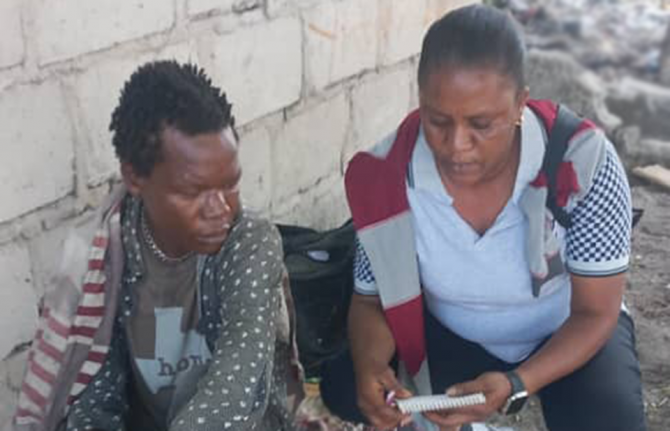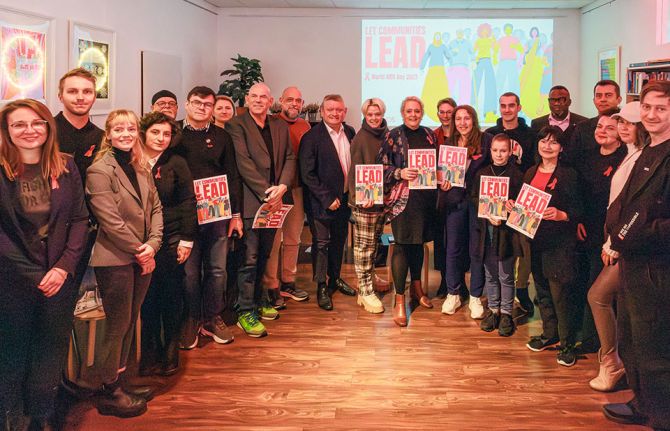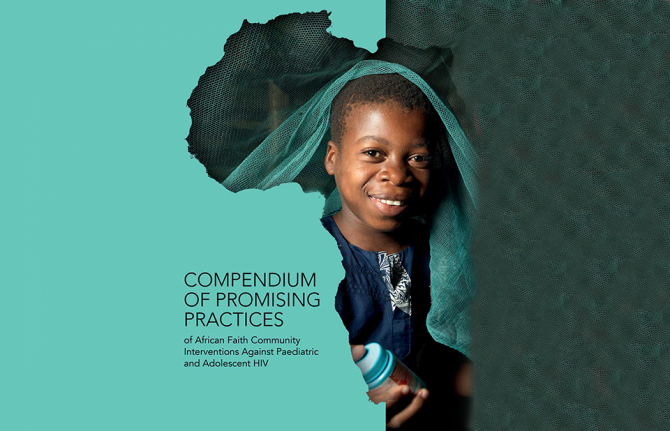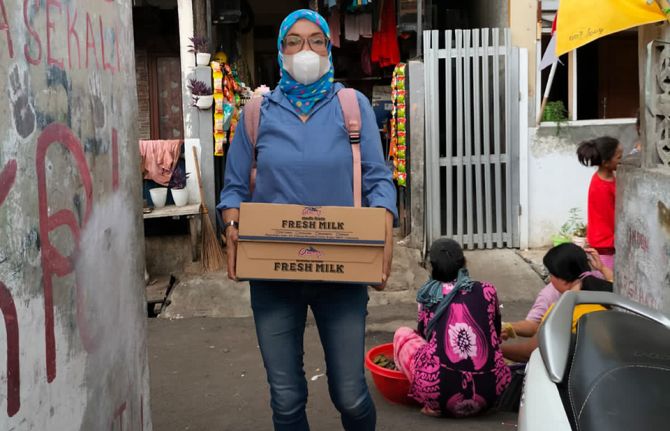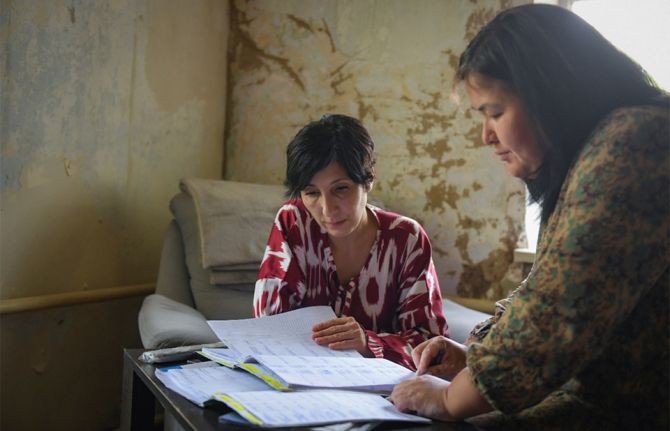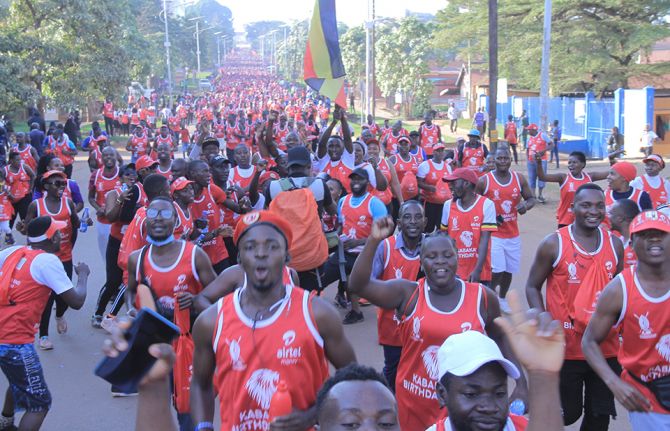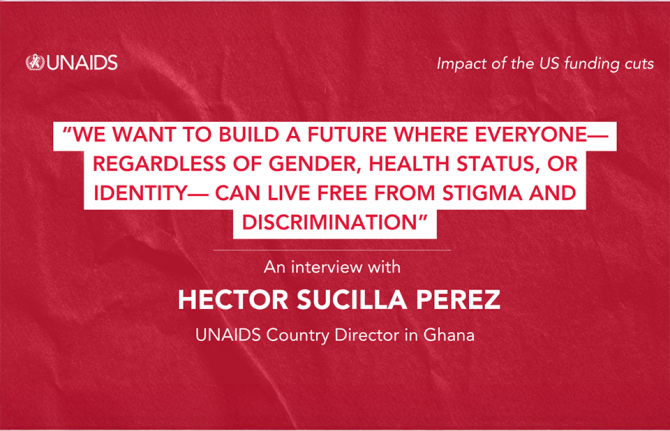
Feature Story
Intensifying HIV prevention: country guidance critical
13 April 2007
13 April 2007 13 April 2007
Across the world, a small but growing number of countries have reduced HIV prevalence through sound prevention efforts. However, in 2006, there were still 4.3 million new HIV infections with over 40% of new adult infections occurring among young people aged 15-24. According to latest estimates, HIV prevention services reach only one in ten of people most at risk.
In an era where the world has committed to working towards universal access to HIV prevention, treatment, care and support by 2010, there is a clear and urgent need to intensify HIV prevention to halt growing infection rates and sustain the gains that have already been made in the AIDS response.
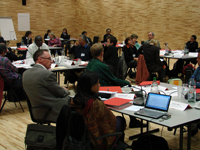
The UNAIDS HIV Prevention Reference
Group met in Geneva in April 2007
The call to expand high quality comprehensive HIV prevention programmes towards the goal of achieving universal access to prevention, treatment, care and support was stressed at the recent meeting of the UNAIDS HIV Prevention Reference Group, held in Geneva at the beginning of April.
Thirty-five HIV prevention experts, from national AIDS authorities, development partners, research institutions and civil society worldwide joined to discuss ways to better support efforts taking place at the country level to increase HIV prevention programmes in size and scale. Through the discussions, the meeting underlined that guidance for countries on the definitions, core components and quality standards for HIV prevention activities is critical to future action.
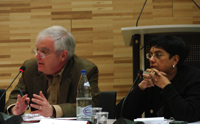
L-R: Professor Michael Merson, Director of
the Global Health Institute at Duke
University with Purnima Mane, UNAIDS
Director for Policy, Evidence and
Partnerships .
“Countries are under pressure to achieve ambitious prevention targets and thus require clear standards for high quality prevention activities,” said Professor Michael Merson, Director of the Global Health Institute at Duke University, who chaired the Reference Group meeting.
“National and sub-national AIDS programmes need to be able to make comparisons about what works and doesn’t work; and to estimate the resources required at country, regional, and global levels to provide universal access to HIV prevention services,” he added.
To assist countries in strengthening their national HIV prevention responses the participants recommended that UNAIDS work with experts in different areas of prevention to define key activities, specify their core components and develop a framework to monitor their quality.
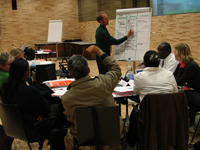
The two-day meeting included break-out
group work on key HIV prevention topics.
“Prevention activities have been delivered successfully and to high standards for years, and clarifying and disseminating min imum quality standards more broadly will assist countries in planning and costing realistic , scaled- up behavioural prevention programmes ,” said Purnima Mane, Director for Policy, Evidence and Partnerships at UNAIDS and co-Chair of the Prevention Reference Group. “ Small differences in definitions can make it difficult to compare the same HIV prevention activities, and to determine what works in different environments.”
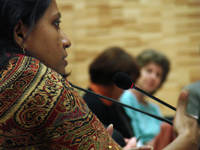
Participant Supriya Sahu, Project Director
of the Tamil nadu State AIDS Control
Society during her intervention at the
meeting.
The two-day meeting of the HIV Prevention Reference Group included presentations in plenary sessions by leading prevention experts on the challenges of defining prevention activities and their core components. A draft framework for assessing the quality of HIV prevention activities also was presented and discussed. Current practice often labels HIV prevention programmes according to single features, such as their target audience (e.g. “sex worker interventions”), objective (e.g. “empowerment interventions”), setting (e.g. “workplace interventions”) and type of activity (e.g. “mass media”), whereas participants underlined the needed nomenclature should recognize that all these features are important parts of the definition and quality standards of any programme . During interactive discussions in plenary and small groups it was emphasized that comprehensive HIV prevention programmes comprise bundles of different activities, each of which can be defined to include a set of critical elements and quality standards for planning and implementation.
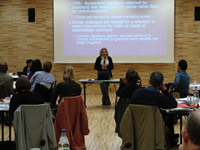
The two-day meeting of the HIV Prevention
Reference Group included presentations in
plenary sessions by leading prevention
experts on the challenges of defining
prevention activities and their core
components
The meeting of the UNAIDS HIV Prevention Reference Group forms part of the ongoing efforts of UNAIDS to support countries to strengthen their national responses to the epidemic. In 2005 UNAIDS published the UNAIDS Policy Position Paper for Intensifying HIV Prevention that outlined the key principles and policy actions for HIV prevention. UNAIDS recently published the UNAIDS Practical Guidelines for Intensifying HIV Prevention which provides countries with practical guidance on the activities that should be undertaken in different epidemic settings to strengthen their national HIV prevention responses within the ambit of Universal Access. The Reference Group meeting initiated a process to define and outline the quality standards and costs for the recommended set of HIV prevention activities outlined in the Practical Guidelines.

UNAIDS Executive Director Dr
Peter Piot attended the last day
of the meeting.
The UNAIDS HIV Prevention Reference Group was established by the Executive Director in 2004 as a forum that brings together leading prevention experts to advise UNAIDS on approaches to strengthen and sustain HIV prevention interventions at the country and regional level. Recognizing that there are many facets to HIV prevention , each meeting of the Reference Group draws upon national AIDS authorities, civil society and scientists based upon their knowledge, expertise and experience in addressing the subject of the meeting.
All photo credits: UNAIDS/S. Imbers
Intensifying HIV prevention: country guidance cri
UNAIDS HIV Prevention Reference Group Meeting:
Agenda (pdf, 49Kb)
List of participants (pdf, 52Kb)
Related Presentations:
Proposed framework - developing a common terminology and indicators (pdf, 52Kb)
A framework for planning and evaluating behavior intervention (pdf, 112Kb)
Defining behavioral interventions (pdf, 451Kb)
Feedback session: defining behavioural interventions (pdf, 88Kb)
Why develop a taxonomy of HIV behavioural intervention activities? (pdf, 125Kb)
Related Documents:
UNAIDS Policy Position Paper for Intensifying HIV Prevention(pdf, 3,8Mb)
UNAIDS Practical Guidelines for Intensifying HIV Prevention(pdf, 1,67Mb)
Audio Interviews:

Peter Mwarogo
Country Director
Family Health International
Listen (mp3 1,25 Mb)

Anuar Luna
Red Mexicana de Personas que Viven con VIH
Listen (mp3 670 Kb)

Michael Sweat
Associate Professor
John Hopkins Bloomberg School of Public Health
Listen (mp3 652 Kb)

Michaela Clayton
Director
AIDS and Rights Alliance for Southern Africa (ARASA)
Listen (mp3 647 Kb)

Feature Story
Securing the future – advocating for children
12 April 2007
12 April 2007 12 April 2007
According to latest estimations, every day there are nearly 1,800
new HIV infections and 1,400 deaths of AIDS-related illnesses
amongst children under 15. Photo credit: UNAIDS/S.Noorani.
Across the world, significant progress is being made in the response to AIDS – political and financial commitment is higher than ever before and in more and more countries effective HIV prevention and treatment programmes are being made more widely available.
But all too often, children are still missing out. Despite the beginnings of progress, children still remain largely absent from national and international political responses to the AIDS pandemic.
According to latest estimations, every day there are nearly 1,800 new HIV infections in children under 15 and more than 6,000 young people aged 15–24 are newly infected with HIV. And every day 1,400 children under 15 die of AIDS-related illnesses.
In response to the urgent need to step up action for children and young people, the UNAIDS Secretariat and cosponsor UNICEF recently joined a group of 40 advocates and activists representing national and global organizations, campaigns, networks, and coalitions in Brussels, Belgium, to define a platform for joint advocacy towards the goal of achieving the first-ever “AIDS Free Generation”. Bringing together perspectives from around the world—and from the grassroots to the global arena—the group shared a deep concern that the lives, rights, and potential of millions of the world’s children are being severely eroded by the devastating impact of HIV.
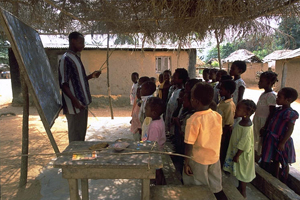
Access to free, safe, comprehensive and quality basic education
for all children will be key to moving towards an "AIDS-free
generation". Photo credit: UNAIDS/L.Taylor
Over the course of three days, the group worked together to define a framework for political change and mobilization for the interests of children in a world living with HIV. Education, HIV prevention, treatment, social protection and financing were identified as five necessary components of the platform for effective advocacy around children and HIV.
On education, the group outlined the need to advocate for access to free, safe, comprehensive and quality basic education for all children, paying particular attention to the needs of girls, and ensuring that schools can play an effective role in HIV prevention and the protection and care of children in AIDS-affected societies.
To prevent new infections among young people and children, the group stressed the urgent and rapid need to advocate for the increase of youth and child-specific HIV prevention programmes, with a focus on ensuring access to comprehensive sexual education, empowering girls, and promoting gender equality.

Advocacy will be key to help ensure that funds are utilized
effectively to reach the children and young people most in need.
Photo credit: UNAIDS/L.Alyanak.
A comprehensive, family-centered approach to care and treatment, and the provision of affordable medicines, diagnostics and health services were underlined as central to the goal of preventing HIV infection in children and ensuring treatment of all children living with HIV.
To move towards comprehensive social protection for AIDS-affected and other vulnerable children, the group stressed that advocacy should focus on preventing stigma and discrimination, providing families and communities with the resources needed to protect children’s well-being, and ensuring access to essential services and care for all orphans and vulnerable children.
For all programmes and action focused on children and young people, the group underlined the fundamental need for full and sustainable financing. Advocacy will be key to help ensure specific funding allocations within national and international development and AIDS budgets and to help ensure that funds are utilized effectively to reach the children and young people most in need.
Underlined as central to all advocacy action towards an ‘AIDS Free generation’ was the active involvement of young people themselves, to build wider alliances, and to inspire others.

The active involvement of young people is critical for all
advocacy action towards an ‘AIDS Free generation’.
Photo credit: UNAIDS/L.Taylor
“Participants in the Summit were engaged, energized, and excited to advocate for an AIDS Free generation,” said Jennifer Delaney, Executive Director of the Global Action for Children. “This was the first step in engaging advocates, governments, the public sector and civil society in realizing this critical goal."
The advocacy group is now developing a cohesive strategy on the five main action areas, which forms the basis for a social movement to better support children affected by HIV. The strategy will include political actions which can be implemented at the national, regional and international levels.
“We are all committed to work with urgency, courage and determination to transform these goals into a new reality for and with children and young people. Future generations must be free of AIDS and spared of its devastating impacts,” said UNAIDS Director of Communication and External Relations, As Sy.
Links:
Download - Children and AIDS: Stocktaking report (2Mb, pdf)
Visit "Unite for Children, Unite against AIDS" Web site

Feature Story
Harm reduction to be scaled up in Ukraine
11 April 2007
11 April 2007 11 April 2007Natalia, a young Ukrainian woman, has been injecting drugs for the last five years. Injecting drug use is a serious problem in Ukraine and is further compounded by high HIV prevalence among people who inject drugs. In Kiev for example the Ukrainian Ministry of Health estimated that in 2006, 49% of people who were injecting drugs in the capital were also infected with HIV.
However, Natalia is one of the luckier ones. She is one of the 110,000 people who accessed harm reduction services in Ukraine in 2006 and has enrolled in a programme of substitution therapy which is helping her to regain a normal life.
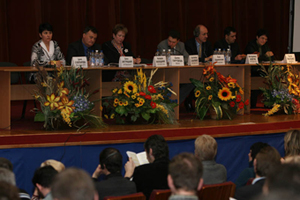
Participants at the 2nd National Conference on Harm Reduction
that took place in Kiev between 21 and 24 March 2007
Natalia was also one of the guest speakers at the 2 nd National Conference on Harm Reduction that took place in Kiev between 21 and 24 March 2007. She addressed an audience of almost 400 participants speaking about her experiences and about the importance of harm reduction programmes in Ukraine. Among her audience were the different stakeholders in Ukraine’s response to AIDS, from government officials to health and social care practitioners, communities of injecting drug users, law enforcement agencies, correctional institutions, and the media. In her speech she said, “With the help of a substitution therapy programme I am now able to live normal life again. It has been six months since my programme started and I am already back home, I contribute to raising my niece and I have a job that I love. None of this would have happened if harm reduction programmes did not work in this country”.
Natalia’s story is a familiar one in Ukraine and highlights the importance of harm reduction programmes in countries which are faced with HIV epidemics that are predominantly fuelled by unsafe injecting drug use. The statistics speak for themselves––while, according to official reports, the proportion of people in Ukraine who inject drugs among all new cases of HIV has decreased (from 60% in 2001 to around 45% in the first half of 2006), there is no evidence that the epidemic among people who inject drugs is declining. Sentinel surveillance conducted in several regions in 2006 showed that the prevalence of HIV infection among injecting drug users ranged from 10% in the city of Sumy to over 66% in the city of Mykolayiv.
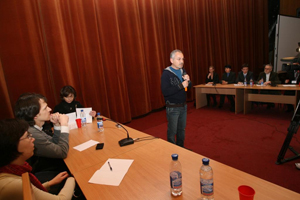
Dialog between AIDS workers and the media facilitated by TV
star Savik Shuster. Photo credit: International HIV/AIDS Alliance
(Ukraine) / N. Kravchuk
“We know that the HIV epidemic can only be reversed if people who inject drugs have access to a comprehensive set of harm reduction interventions, including information, access to sterile injecting equipment, condoms, drug substitution treatment, and HIV treatment, care and support. In countries and cities where harm reduction programmes have been implemented early and on a large scale, HIV prevention programmes have been successful in reducing HIV prevalence among people who inject drugs––down to less than 5% in some cases. This is why harm reduction is officially supported by the UN system,” said Mr. Paul Bermingham, World Bank Country Director for Ukraine, Moldova and Belarus, and Chair of the UN Theme Group on HIV/AIDS in Ukraine.
During the conference both groups working on the ground and high level governmental officials also stressed the importance of harm reduction interventions, including drug substitution therapy, for an effective national AIDS response in Ukraine. The Head of the Ukrainian AIDS Centre, Professor Alla Shcherbynska said, “ Ukraine has decided to scale up harm reduction programmes with the aim of moving towards universal access to HIV prevention, treatment, care and support by 2010. That has now become our national goal. How quickly we reach this goal will depend upon how efficiently we scale up and improve the quality of harm reduction services, including drug substitution therapy.”
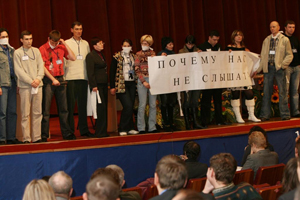
Activists representing communities of people who inject drugs
seized the stage and expressed their frustration for being
sidelined by society and discriminated against.
During the conference activists representing communities of people who inject drugs who seized the stage and expressed their frustration for being sidelined by society and discriminated against. They asked, “Why don’t they hear us? We are not a problem; we are part of the solution”.
Participants also discussed and promoted strategies for better involvement of communities of people who inject drugs and local governmental entities in harm reduction programmes and decision making. Participants praised the successes of pilot projects implementing drug substitution therapy and discussed ways to scale-up programmes across the country.
“We must begin to integrate planning and action for the future into the response as from today,” said Dr. Ani Shakarishvili, UNAIDS Country Coordinator in Ukraine. “First and foremost, we need to find ways to ensure that AIDS, harm reduction and drug substitution therapy, gender issues, reduction of vulnerability, stigma and discrimination towards people who inject drugs, people living with HIV and others remain a top political priority in Ukraine, year in and year out, and this conference is a big step towards achieving that.”
At the close of the conference, the community of people who inject drugs presented a joint statement on behalf of all the participants addressed to the Government of Ukraine, donor communities, and civil society calling for key actions and decisions.
The day after conference the State Department of Ukraine on Enforcement of Sentences issued a decree establishing a working group tasked with implementing an action plan on harm reduction measures in Ukrainian prisons. Providing needle and syringe exchange services in penal institutions is likely to be one important, tangible and immediate outcome of the conference.
Links:
More information on Ukraine
UNAIDS Best Practice Collection: HIV Prevention among Injecting Drug Users in Traditional and Developing Countries (pdf, 1,53 Mb)

Feature Story
Not any different from you!
04 April 2007
04 April 2007 04 April 2007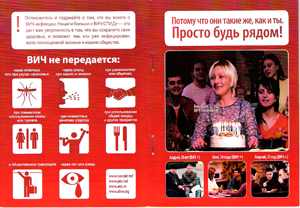
Brochures, posters, calendars, and other informational materials
that are being distributed throughout the country as part of the
media campaign to end stigma and discrimination.
“I cannot get infected, because I don’t live in Africa,” says Mihai, a 35-year-old man living in the capital of the Republic of Moldova, Chisinau . “Also, I don’t do drugs, I don’t practice sex for money, and I’m not gay. So, I cannot get infected”, he adds.
Alexandru, 23 years old, remembers: “One of my schoolmates is HIV-positive. After the class reunion, we continued our discussion at my place. When everybody left, I tried to remember which objects he had touched; I didn’t know what to do with the dishes he had used.”
These testimonials are part of a recently launched national campaign to promote solidarity with people living with HIV in Moldova. Extracted from real life examples, they reveal deeply rooted misconceptions about AIDS in Moldova.
“In 2005, we discovered with great concern the results of a survey on the attitude toward people living with HIV” said Mrs. Gabriela Ionascu, the UNAIDS Country Coordinator in Moldova. “We had to address stigma associated with HIV in Moldova urgently”.
The survey conducted by the AIDS Foundation East-West revealed that 74% of the respondents believed that people living with HIV should not be allowed to attend medical and social facilities used by the rest of the society. 64% of people surveyed said they experienced a certain degree of fear toward HIV-positive people, 45% expressed disgust, 37% felt anger, while 41% were totally indifferent.
Cooperating with UNAIDS, the Moldovan National Coordination Council, the Ministry of Health and Social Protection, as well as the Moldovan Orthodox Church—the AIDS Foundation East-West developed a concept for a large scale national campaign. The group raised sufficient funds to produce four video clips for national television, short radio messages and outdoor advertisement billboards. With financial support from the Swedish International Development Cooperation Agency (SIDA), the campaign aims to overcome groundless fears and negative attitudes toward people directly affected by HIV and debunking some of the myths around AIDS by conveying accurate information about HIV transmission.
Under the slogan “Because they are no different from you. Just be supportive!” the campaign will run, over four months, in five regions: Chisinau, Baltsi, Edinets, Comrat, and Tiraspol. A number of social events are also planned to encourage interactions and debates.
The campaign gives voice to people living with HIV who tell their stories of injustice and rejection by other members of their communities. It also allows HIV-negative people to speak about their fears regarding HIV as well as how they managed to overcome them. Every effort is made to facilitate identification with the characters in the campaign and to go against the idea that AIDS is a far distant problem.
“This campaign is unique”, says Elena Voskresenskaya, Regional Director of the AIDS Foundation East-West, “because for the first time such an activity involves people living with HIV. This is their first attempt to tell the society about their feelings, fears, problems, and dreams, thus striving to elicit a more tolerant attitude toward HIV and AIDS”.
According to the latest official figures, approximately 3 400 people are living with HIV in 2007 in the Republic of Moldova.
AIDS Foundation East-West (AFEW) is a Dutch nongovernmental humanitarian organization working in the field of public health to reduce the impact of HIV in Eastern Europe and Central Asia. AFEW works in all areas of prevention and treatment, and has gained valuable experience in conducting informational campaigns. AFEW is guided by international best practices which take into account and use the specific mentalities and traditions of the people in every country.
Links:
View the videos
UNAIDS Moldova website
AIDS Foundation East-West (AFEW) website

Feature Story
AIDS events continue at World Cricket Cup
03 April 2007
03 April 2007 03 April 2007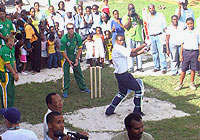
South African cricket team fielding coach
Jonty Rhodes (left) and wicketkeeper AB de
Villiers (centre) watch a young cricketer hit.
The cricket team visited the Dorothy Bailey
Health Centre in Georgetown, Guyana.
Phot credit:UNICEF/Wilson
“Every wicket counts in cricket, and it’s the same with the fight against AIDS - everybody’s contribution makes a difference.” These were the words of the UNAIDS Country Coordinator for Guyana and Suriname, Dr. Ruben del Prado, speaking during a visit by members of the South African cricket team to the Dorothy Bailey Youth Health Centre in Georgetown, Guyana.
After their close victory over Sri Lanka in the Super 8 stage of the ICC Cricket World Cup 2007, the South African team decided to take some time off and show their support for the health centre and its initiatives for young people living with HIV, the first of its kind in Guyana.
Using teamwork to defeat AIDS
Led by Minister of Health Dr. Leslie Ramsammy, UNICEF Guyana Representative Johannes Wedenig and Dr. del Prado, the cricket team was escorted into a crowded hall full of schoolchildren and other guests. Under banners calling people to “Unite for Children, Unite against AIDS”, two local schoolchildren, Murisa and Darren, welcomed everyone and spoke of the need to fight against the spread of the HIV.
Dr. Ramsammy told the assembly that HIV and AIDS was a global problem. “We are all in this together and AIDS can only be beaten if we work as a team,” he remarked.
Mr. Wedenig said it was heartening to see the peoples of South Africa and Guyana joining hands in a common cause. “Knowledge is power,” said Mr. Wedenig. “By empowering children with knowledge to protect themselves, we can win.”
Speaking on behalf of the South African cricketers, the team’s fielding coach, Jonty Rhodes, said that as well-known sportsmen they had the opportunity to highlight global challenges facing society. “ South Africa has a high prevalence of HIV,” he said, and the national cricket team is “committed to doing all we can to raise awareness about HIV, and fight the stigma and discrimination that surround it”.
Through an informal question and answer session with the participating young people and media, the world-famous right-handed batsman reiterated the importance of knowledge, teamwork and endurance in order to successfully fight HIV; similar to the skills needed for winning a cricket match.
Realizing dreams
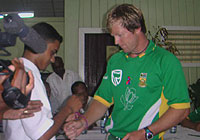
Saud, a Guyanese student, ties a Band of
Commitment on the wrist of Jonty Rhodes,
the South African cricket team’s fielding
coach at the Dorothy Bailey Health Centre
in Georgetown, Guyana.
Phot credit:UNICEF/Wilson
In a solemn moment, Mr. Rhodes and a Guyanese student, Saud, tied Bands of Commitment on each other’s wrists, as all present pledged to protect themselves and each other against HIV.
South African star bowler, Shaun Pollock, spoke of his three-year-old daughter, “She has dreams just like other kids,” he said. “I need to make sure that she can realize her dreams.”
After the formal ceremony, the visitors toured Dorothy Bailey Health Centre before everyone went outside to play cricket. On a bumpy grass-and-sand wicket next to the centre, Mr. Pollock lobbed soft balls to Minister of Health Dr. Ramsammy, who played a secure, straight bat before being caught in the slips.
The event was one of many taking place across the region on the occasion of the World Cup organized by the partnership between the International Cricket Council (ICC), UNICEF, UNAIIDS and the Caribbean Broadcast Media Partnership on HIV/AIDS, to highlight the situation of children and young people living with and affected by HIV.
This story first appeared on the special ICC Cricket World Cup section of the Unite for Children Unite against AIDS web site – uniteforchildren.org
Links:
Read “Cricket World Cup raises AIDS awareness"
For more information on the AIDS activities around the Cricket World Cup and to access the public service announcements please visit the following links:
Special page on Cricket World Cup
International Cricket Council
Live Up Campaign
Caribbean Broadcast Media Partnership on HIV/AIDS

Feature Story
Be Smart winners!
03 April 2007
03 April 2007 03 April 2007
Prizes have been given out for the “Be smart protect yourself” competition with winners receiving sweatshirts signed by UNAIDS Special Representative Michael Ballack.
The competition was announced in connection with the launch of the UNAIDS Public Service Announcement (PSA) “Be smart protect yourself” featuring Michael Ballack. The footballer talks about HIV prevention and urges young people to make smart choices.
Dressed in a one of the coveted red UNAIDS sweatshirt, Ballack spent a rainy afternoon at the famous London stadium, Stanford Bridge, taping the HIV prevention video. The PSA script was prepared by UNAIDS and produced by partner Aljazeera TV. The announcement is available in both English and German and has been broadcast around the world.
Ballack’s popularity helped reach a large audience – participants from 44 countries entered the competition giving the correct data to a key question – how many people were newly infected with HIV in 2006. The correct answer is an estimate of 4.3 million people. Young people are at particular risk, accounting for 40% of new infections in 2006 among people 15 years and older.
Michael Ballack, captain of the German Football team and worldwide a role model to young people, signed up with UNAIDS in May 2006 as Special Representative and has dedicated time and effort to raise awareness on HIV issues through the mass media and the world of sport. During the 2006 FIFA World Cup Michael Ballack was featured in social marketing advertisements in the German magazine Der Spiegel and in the 60 th anniversary issue of TIME magazine. Ballack has also used new media to draw attention to the issue by posting AIDS awareness messages on his own web site http://www.michael-ballack.com/.
Football is one of the most popular sports worldwide and sports stars such as Michael Ballack can be important role models for many young people. Sport is also a force for change as it can build self-esteem and important life skills.
Links:
Read statements from participants
Watch Michael Ballack's Public Service Announcement (PSA) (Video will open in a new window)
Related

Feature Story
Thailand’s condom chain World Record
02 April 2007
02 April 2007 02 April 2007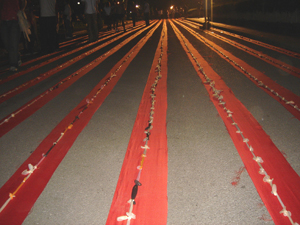
On 1 December 2006, UNAIDS joined with a broad range of UN and Thai partners to organize a World AIDS Day event with a difference.
As well as hosting a packed celebration event, Thailand captured international attention with an attempt to create the world’s longest chain of condoms.
And at the end of March, confirmation arrived—at 2,715 metres long, the condom chain sets a new Guinness World Record™.
The tying of the world’s longest chain of condoms was one of the events of the “Condom Chain of Life Festival”, a unique celebration of World AIDS Day, held at Lumpini Park in Bangkok. The festival was organized by the United Nations Educational, Scientific and Cultural Organization (UNESCO) Bangkok in collaboration with the Thai Red Cross, PLAN Thailand, UNAIDS and local NGOs as part of efforts to promote the acceptance of condoms, emphasize the need for safe sex, and encourage strengthening of national policies for comprehensive treatment, care and support for people living with and affected by HIV.
UNAIDS Special Representative Senator Mechai Viravaidya, well known for his groundbreaking HIV prevention efforts in Thailand, led the tying of the chain.
Here, UNAIDS Country Coordinator for Thailand, Patrick Brenny, tells (click on link below to listen to the interview) www.unaids.org about how the World Record attempt came about and its importance to the Thai AIDS response.
Links:
Listen to the interview with UNAIDS Country Coordinator for Thailand (mp3, 3 MB)
Read UNESCO press release: Record set for world’s longest condom chain

Feature Story
HIV/TB features in World TB Day events
30 March 2007
30 March 2007 30 March 2007
Mr. Jorge Sampaio, UN Special Envoy to
Stop TB helping to give out TB treatment
at the Martin Preuss Centre in Malawi.
Photo credit:S.Muguro
Tuberculosis was declared a national public health emergency in Malawi this week. More than 77% of TB patients in Malawi are also HIV positive and TB is the leading cause of death among people living with HIV.
The UN Special Envoy to Stop TB, Mr. Jorge Sampaio and WHO Regional Director for Africa, Dr. Luís Gomes Sambo, attended a ceremony hosted by the Honourable Mrs. Marjorie Ngaunje, Minister of Health, to launch the new five-year plan to
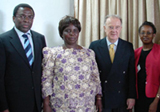
L to R: Dr. Gomes Sambo, WHO
Regional Director for Africa;Hon.
Marjorie Ngaunje, M.P.,Malawi
Minister of Health; Mr.Sampaio,
UN Special Envoy to Stop TB;
Dr. Moeti, WHO Representive,
Malawi
tackle the tuberculosis emergency. The plan seeks to increase access to TB diagnostic and treatment services, improve collaboration between the TB and HIV services and strengthen community involvement.
In Ghana UNAIDS, UNICEF and WHO joined civil society representatives, traditional leaders and politicians to launch a National Stop TB Partnership on World TB Day.
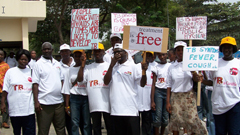
Civil society partners march through the streets to
raise awareness of TB and HIV on World TB Day in
Ghana. Photo credit: T.Erkkola
Collaboration between the TB and HIV programmes has already been fruitful in Ghana but needs to be increased to reduce the high death toll from HIV/TB co-infection.
UNAIDS HIV/TB Adviser, Dr Alasdair Reid, said: “Increasingly we are realising that we cannot address AIDS without addressing TB and vice versa. The best way to do this is through HIV and TB programme collaboration”
HIV/TB features in World TB Day events
Links:
UNAIDS TB page
UN Special Envoy to Stop TB
Stop TB Partnership
World TB Day Events
The Global Plan to Stop TB
New WHO Data on TB
Stop TB eForum (HDN)
Videos:

Fight HIV, Fight TB, Fight Now
The Human Face of TB
Related stories:
TB Anywhere is TB Everywhere
Joining forces to tackle TB and HIV
Factsheets:
Frequently asked questions about Tuberculosis and HIV (33 Kb, pdf)
Frequently asked questions about XDR-TB (33 Kb, pdf)
Other Links:
What the papers aren't saying - How can we enhance media coverage of TB? (Panos Report)

Feature Story
UNAIDS acts to strengthen ‘GIPA’ with new policy
30 March 2007
30 March 2007 30 March 2007Supporting the active engagement of people living with HIV in the AIDS response is one of UNAIDS’ most important goals. Building on its work in this area, UNAIDS has developed a policy brief with recommendations for governments, civil society and international donors on how to increase and improve the involvement of people living with HIV in global, regional and country AIDS responses.
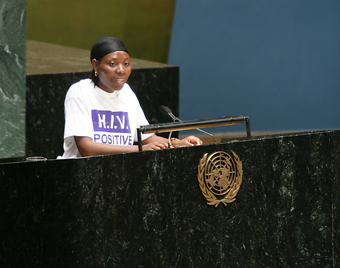
Nkensani Mavasa from South Africa addressing the United Nations
General Assembly on HIV and AIDS in New York. Credit: UNAIDS/J.Rae
GIPA or the ‘Greater Involvement of People Living with HIV/AIDS’ is a principle that aims to realize the rights and responsibilities of people living with HIV, including their right to participation in decision-making processes that affect their lives. GIPA aims to enhance the quality and effectiveness of the AIDS response and is critical to progress and sustainability.
The idea that personal experiences should shape the AIDS response was first voiced by people living with HIV in Denver in 1983. The GIPA Principle was formalized at the 1994 Paris AIDS Summit when 42 countries agreed to “support a greater involvement of people living with HIV/AIDS at all levels and to stimulate the creation of supportive political, legal and social environments”.
GIPA seeks to ensure that people living with HIV are equal partners and breaks down simplistic and false assumptions that those living without HIV are “service providers” and as those living with HIV are “service receivers”.
The new UNAIDS policy brief gives an overview of the context for the policy brief, underlines why this principle is key to the long-term sustainability and development of the AIDS response, highlights some of the challenges to achieving GIPA and outlines a number of actions governments and other bodies need to implement to ensure the principle is put into practice.
“No single agency can provide for the full spectrum of needs of people living with HIV: partnerships between actors are therefore needed,” says Kate Thomson, UNAIDS GIPA focal point. “To enable the active engagement of people living with HIV, UNAIDS urges all actors to ensure that people living with HIV have the space and the practical support for their greater and more meaningful Involvement.”
Governments, international agencies and civil society are urged to implement and monitor minimum targets for the participation of people living with HIV, including women, young people and marginalized populations, in decision-making bodies.
The policy brief also underlines that selection processes should be inclusive, transparent and democratic and that people living with HIV should be involved in developing funding priorities and in the choice, design, implementation, monitoring and evaluation of HIV programmes from their inception. “The engagement of people living with HIV is all the more urgent as countries scale up their national AIDS responses to achieve the goal of universal access to prevention, treatment, care and support services,” states the brief.
Wide ranging benefits
Measuring involvement of people living with HIV in policy is not an easy or exact science; yet, experiences have shown that when communities are proactively involved in ensuring their own well-being, success is more likely. People living with HIV have directly experienced the factors that make individuals and communities vulnerable to HIV infection. As a result, their involvement in programme development and implementation and policy-making will improve the relevance, acceptability and effectiveness of programmes.

An HIV positive woman addressing students at the University of Beijing,
People's Republic of China, during a session organized by a local NGO
to raise AIDS awareness. Credit: UNAIDS/K.Hesse
“Positive people bring the unique perspective of their experience to the range of organizations and agencies working in AIDS, “ says Dr Keven Moody, International Coordinator for the Global Network of People Living with HIV and AIDS, GNP+.
As the policy brief underlines, the benefits of GIPA are wide ranging. At the individual level, involvement can improve self-esteem and boost morale, decrease isolation and depression, and improve health through access to better information about care and prevention. Within organizations, the participation of people living with HIV can change perceptions, as well as provide valuable experiences and knowledge. At the community and social levels, public involvement of people living with HIV can break down fear and prejudice by showing the faces of people living with HIV and demonstrating that they are productive members of, and contributors to, society.
“The participation and contribution of people living with HIV is one of the best examples of global progress in public health. We have come from a place where people openly living with HIV were stoned to death, to a place where we have been invited to stand among the leaders of the world to shape international policies,” said Gracia Violeta Ross, the National Chiar of the Bolivian Network of People Living with HIV/AIDS. “There is still a long way to walk but we have made historical changes and gains of which we can be proud,” she said.
From principle to action: Leading by example
The policy brief draws on examples of policy makers, county and community actions that are transforming GIPA from principle to action. In Tanzania, nearly 80% of Tanzanian parliamentarians are dues-paying members of the Tanzanian Parliamentarians’ AIDS Coalition (TAPAC). Putting the principle into practice, TAPAC engages people living with HIV as advisers and organizes regular roundtable meetings with them to discuss issues. TAPAC members meet people living with HIV in their constituencies and publicly speak up in favour of GIPA. “You cannot plan for [people living with HIV]; you have to plan with them! Political leaders have to stand up for the rights of people living with HIV by enacting laws, budgeting for programmes and also by speaking up in ways that will normalize HIV,” said the Honourable Lediana Mafuru Mng’ong’o, Member of Parliament, Tanzania, Chair of the Coalition of the African Parliamentarians against HIV/AIDS and the Tanzanian Parliamentarians’ AIDS Coalition, who’s ‘voice’ is featured in the UNAIDS policy brief.
“If we want to win the battle against HIV, the full participation of people living with HIV in the AIDS response is necessary. At the same time, people living with HIV need to stand united, they need to strengthen their organizations and they need to speak with one voice in order to influence policy makers and to realize GIPA,” he added.

Russian civil society networks, including people living with HIV, during a
workshop on community-based advocacy and networking to scale up HIV
prevention. Credit: UNAIDS/S. Drakborg
Similarly i n Kazakhstan-also featured in the policy brief— there is a growing movement to engage people living with HIV in the response. Today, the country’s national and local level strategic planning and monitoring and evaluation processes actively engage people living with HIV.
But a s Dr Yerasilova Isidora, Director General, the Republican AIDS Centre (National AIDS Programme) outlines in the policy brief, the involvement of people living with HIV is not always straightforward, or welcomed. In Kazakstan the majority of people living with HIV are injecting drug users and sex workers and involving them in the response is often met with mistrust and opposition. Nevertheless, policy makers have taken a stand and pushed forward the agenda.
“We have managed to identify several partners [among groups and networks of people living with HIV] and have supported them by developing their personal and institutional capacities to become proactive and to make their voices heard,” she explains in the brief. Slowly but surely, Kazakstan is seeing results: In Temirtau, the city facing the largest HIV epidemic in Central Asia, more people living with HIV are openly talking about their status, which is improving public understanding and reducing stigma.
“Positive people have a great deal to contribute towards the challenges posed by AIDS, if they are given the opportunity to spell out their needs on an equal platform with government and non-government organizations.”
Links:
Download UNAIDS Policy Brief

Feature Story
Burkina Faso: 'Exceptional leadership' on AIDS
27 March 2007
27 March 2007 27 March 2007At the 6 th annual session of Burkina Faso’s National AIDS Commission, President Blaise Compaoré underlined his personal commitment to fighting AIDS as he chaired the one-day session and called for a scaling-up of the AIDS response towards universal access to HIV prevention, treatment, care and support in the country.
The annual session brought together actors involved in the country’s AIDS response to discuss ways forward in coordination of the response, to outline achievements in 2006 and to agree on action to strengthen AIDS action in Burkina Faso.

The President of Burkina Faso, who also serves as President of the National AIDS Commission, welcomed participants and highlighted Burkina Faso’s commitment to tackling AIDS issues and the necessity to make the country’s response an inclusive one, involving partners from all sectors of society. He outlined the significant results that had been achieved, particularly in Burkina Faso’s HIV prevention strategy, and thanked both public and private sectors for their hard work in the area of prevention.
UNAIDS Director of Country and Regional Support, Michel Sidibe, attended the session and heralded the President’s concrete commitment to AIDS. “The participation of President Compaoré is an example of truly exceptional leadership on AIDS—chairing for 10 hours of the meeting, engaging and motivating all sectors of the response and driving action forward,” he said.
“Burkina Faso is on the right road. The challenge now is to coordinate these efforts to make the response as effective as possible and to make the goal of universal access to HIV prevention, treatment care and support a reality. We at UNAIDS will do all we can to support Burkina Faso in doing this,” he added.

The session was well represented with around 200 people from different sectors of the AIDS response in Burkina Faso including ministers, parliamentary representatives, religious groups, youth groups, women’s organisations, associations of people living with HIV, technical and financial partners, private sector representatives and regional governors. In addition, representatives from National AIDS Commissions from the neighbouring countries of Benin, Mali, Niger, Senegal and Togo were present at the session as well as the UNAIDS Regional Support Team for West and Central Africa.
During the meeting participants reported on and analysed data from 2006 and made specific recommendations in the areas of planning, coordination and technical support; transfer of resources and monitoring and evaluation of the epidemic for 2007 and beyond.
In a communiqué finale issued at the close of the meeting, the National AIDS Commission underlined the recommendations for the country to reinforce coordination and partnerships within the response and to give greater focus and develop specific strategies on the issue of gender and AIDS, fighting stigma and discrimination and improving paediatric treatment and care.

“Burkina Faso has made great progress in the response to AIDS over recent years and the results are encouraging, we have seen a levelling off––and in some urban sites a decline––in HIV prevalence,” said UNAIDS Country Coordinator for Burkina Faso, Mamadou Sakho Lamine. “However, Burkina Faso still has a serious generalised epidemic, increasingly women are becoming infected and there is evidence that new infections are also on the rise among young people. There is still much to be done,” he added.
At the close of the session, President Compaoré called on participants to ‘double their efforts in the fight against AIDS’ and congratulated them on constructive suggestions and recommendations which will help strengthen the AIDS response in Burkina Faso.
Links:
Read "Communique final de la sixieme session du Conseil National de Lutte contre le SIDA et les IST" (54 Kb, pdf)
Read "Le Président du Faso sollicité pour un plaidoyer sous-régional contre le Sida"
Visit Présidence du Faso Website



